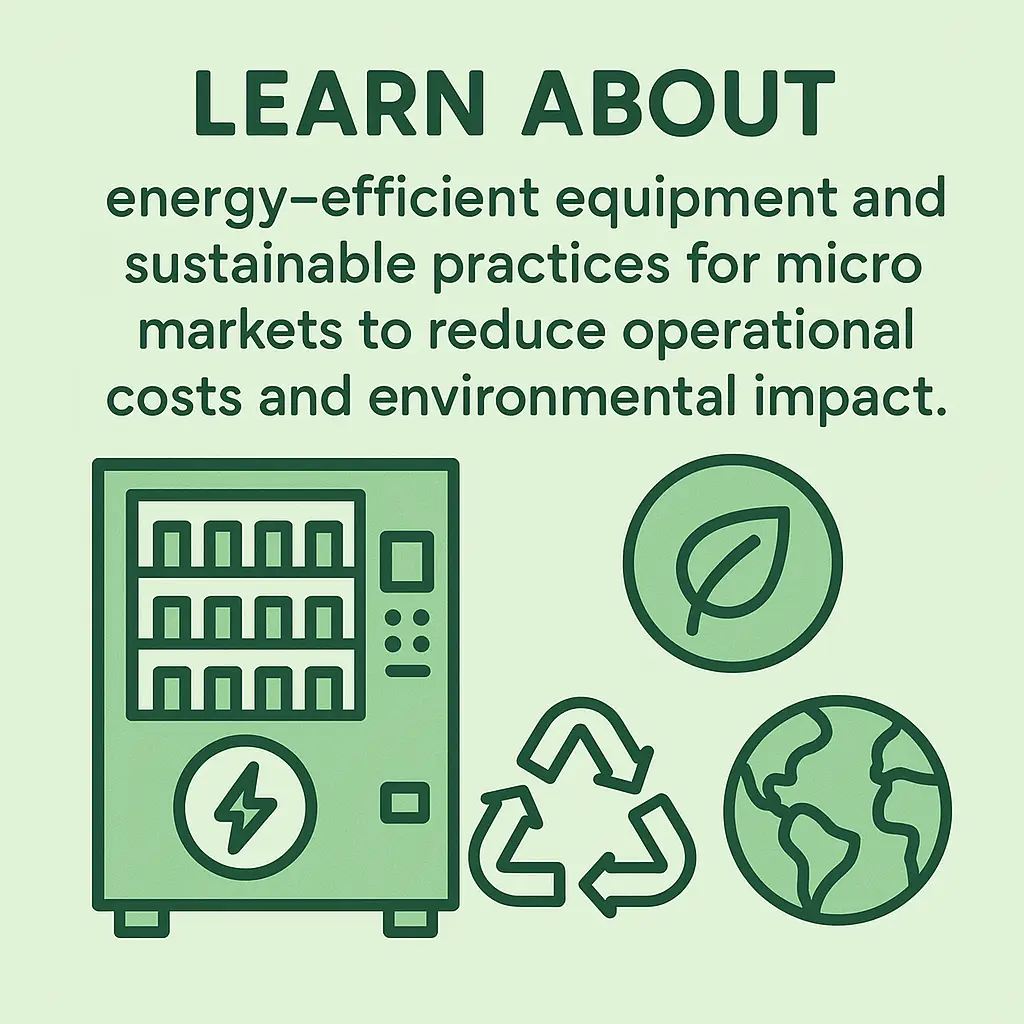Energy Efficiency in Micro Markets
Learn about energy-efficient equipment and sustainable practices for micro markets to reduce operational costs and environmental impact.
Back to Micro Market Services ResourcesLearn about energy-efficient equipment and sustainable practices for micro markets to reduce operational costs and environmental impact.
Back to Micro Market Services ResourcesImplementing energy-efficient solutions in your micro market isn't just good for the planet; it's smart business, directly impacting your bottom line through reduced operational costs.
![]() Significantly lower electricity consumption and utility bills
Significantly lower electricity consumption and utility bills
![]() Boost brand image with a commitment to environmental responsibility
Boost brand image with a commitment to environmental responsibility
![]() Modern, reliable equipment reduces maintenance and extends lifespan
Modern, reliable equipment reduces maintenance and extends lifespan

Micro markets offer unparalleled convenience and variety, but they also consume a significant amount of energy, primarily due to continuous refrigeration and lighting. Embracing energy efficiency in micro market design and operation is crucial for reducing operational costs and supporting corporate sustainability initiatives. By strategically selecting equipment and implementing smart practices, businesses can create micro markets that are both economically viable and environmentally responsible.
The foundation of an energy-efficient micro market lies in its equipment. Opting for Energy Star certified refrigerators, freezers, and coolers is a primary step. These appliances are engineered to perform efficiently, using advanced insulation, variable speed compressors, and intelligent defrost cycles that reduce electricity consumption without compromising cooling performance. Furthermore, replacing traditional lighting with LED solutions for both product displays and ambient illumination can drastically cut energy use. LED lights not only consume less power but also generate minimal heat, further reducing the load on cooling systems. Learn more about how modern units save power by exploring information on low-power cooling systems in vending machines.
Beyond equipment choices, day-to-day operational practices play a vital role in maximizing energy efficiency. Regular maintenance of refrigeration units, including cleaning coils and checking door seals, ensures they run at peak performance. Implementing smart power management systems that include programmable thermostats and automated lighting controls can significantly reduce energy waste during off-peak hours or when the micro market is less trafficked. Technologies that track inventory, such as those found in inventory tracking with AI coolers, can also help optimize stocking, reducing the frequency of door openings and maintaining consistent temperatures.
Modern micro markets can leverage cutting-edge technology to achieve superior energy management. Telemetry systems and remote monitoring allow operators to track energy consumption in real-time, identify inefficiencies, and make immediate adjustments. For instance, sensors can detect when a market is empty and automatically dim lights or adjust refrigeration settings. These smart solutions not only save energy but also provide valuable data for continuous improvement. The evolution of such technologies is also evident in traditional vending. Discover how operators manage their fleets and optimize routes by using cloud-based vending management systems that leverage data.
Energy efficiency in micro markets refers to the use of equipment and practices that reduce electricity consumption, lower operational costs, and minimize environmental impact.
It helps reduce electricity bills, contributing to higher profitability, and supports corporate sustainability goals by lessening the carbon footprint.
This includes Energy Star certified refrigerators, freezers, and smart coolers, as well as LED lighting for displays and ambient lighting.
Energy Star appliances are designed to use less energy than standard models, often incorporating advanced insulation, efficient compressors, and smart controls.
Yes, LED lighting consumes significantly less electricity and has a longer lifespan compared to traditional fluorescent or incandescent bulbs, reducing both energy and maintenance costs.
Regular maintenance of refrigeration units, proper load management, optimizing thermostat settings, and turning off non-essential lighting after hours and in non-peak times.
Yes, smart thermostats, remote monitoring systems, and advanced power management solutions can track usage patterns and automatically adjust settings for optimal efficiency.
No, modern energy-efficient refrigeration units are designed to maintain optimal temperatures reliably, ensuring product freshness and safety without increased energy use.
While initial investment might be slightly higher for energy-efficient models, the long-term savings on electricity bills and reduced maintenance typically result in a favorable return on investment.
Businesses can conduct energy audits, monitor electricity bills over time, and utilize smart metering solutions to pinpoint areas of high consumption and potential savings.